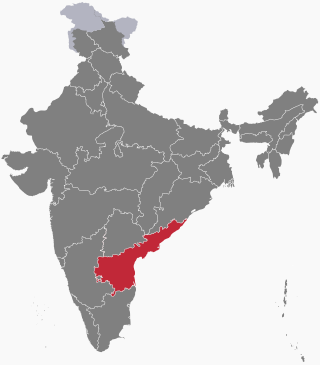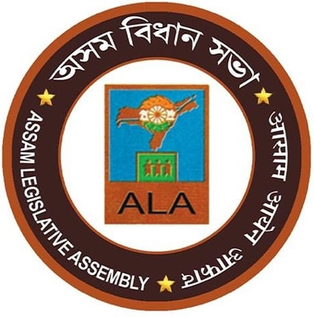
The Lok Sabha, also known as the House of the People, is the lower house of India's bicameral Parliament, with the upper house being the Rajya Sabha. Members of the Lok Sabha are elected by an adult universal suffrage and a first-past-the-post system to represent their respective constituencies, and they hold their seats for five years or until the body is dissolved by the president on the advice of the council of ministers. The house meets in the Lok Sabha Chambers of the Parliament House, New Delhi.

The Parliament of India or Indian Parliament, is the supreme legislative body of the Republic of India. It is a bicameral legislature composed of the Rajya Sabha and the Lok Sabha. The president of the Republic of India, in their role as head of the legislature, has full powers to summon and prorogue either house of Parliament or to dissolve the Lok Sabha, but they can exercise these powers only upon the advice of the prime minister and the Union Council of Ministers.
The State Legislative Assembly, or Vidhana Sabha, or Saasana Sabha, is a legislative body in each of the states and certain union territories of India. In 28 states and 8 union territories, there is a unicameral legislature which is the sole legislative body. In 6 states, the legislative assembly is the lower house of their bicameral legislature with the upper house being the State Legislative Council. 5 union territories are governed directly by the Union Government of India and have no legislative body.
A member of the Legislative Assembly (MLA) is a representative elected by the voters of an electoral district (constituency) to the legislature of State government in the Indian system of government. From each constituency, the people elect one representative who then becomes a member of the Legislative Assembly (MLA). Each state has between seven and nine MLAs for every Member of Parliament (MP) that it has in the Lok Sabha, the lower house of India's bicameral parliament. There are also members in three unicameral legislatures in Union Territories: the Delhi Legislative Assembly, Jammu and Kashmir Legislative Assembly and the Puducherry Legislative Assembly. Only a Member of the Legislative Assembly can work as a minister for more than 6 months. If a non-Member of the Legislative Assembly becomes a Chief Minister or a minister, he must become an MLA within 6 months to continue in the job. Only a Member of the Legislative Assembly can become the Speaker of the Legislature.

The West Bengal Legislative Assembly is the unicameral legislature of the Indian state of West Bengal. It is located in the B. B. D. Bagh area of Kolkata, the capital of the state. Members of the Legislative assembly are directly elected by the people. The legislative assembly comprises 294 Members of Legislative Assembly, all directly elected from single-seat constituencies. Its term is five years, unless sooner dissolved.

Bihar Government is the state government of the Indian state of Bihar and its nine divisions which consist of districts. It consists of an executive, led by the Governor of Bihar, a judiciary and legislative branches.

The Central Legislative Assembly was the lower house of the Imperial Legislative Council, the legislature of British India. It was created by the Government of India Act 1919, implementing the Montagu–Chelmsford Reforms. It was also sometimes called the Indian Legislative Assembly and the Imperial Legislative Assembly. The Council of State was the upper house of the legislature for India.

Elections in Andhra Pradesh are conducted in accordance with the Constitution of India. The Assembly of Andhra Pradesh creates laws regarding the conduct of local body elections unilaterally while any changes by the state legislature to the conduct of state level elections need to be approved by the Parliament of India. In addition, the state legislature may be dismissed by the Parliament according to Article 356 of the Indian Constitution and President's rule may be imposed.

The Tamil Nadu Legislative Assembly is the unicameral legislature of the Indian state of Tamil Nadu. It has a strength of 234 members, all of whom are democratically elected using the first-past-the-post system. The presiding officer of the Assembly is the Speaker. The term of the Assembly is five years, unless dissolved earlier.
State Governments of India are the governments ruling over the 28 states and 3 union territories of India with the head of Council of Ministers in every state being the Chief Minister. Power is divided between the Union government and the state governments.

The Assam Legislative Assembly is the unicameral legislature of the Indian state of Assam. It is housed in Dispur, the capital city of Assam, geographically situated in present Western Assam region. The Legislative Assembly comprises 126 Members of Legislative Assembly, directly elected from single-seat constituencies. Its term is five years, unless sooner dissolved.

The Jammu and Kashmir Legislative Assembly, also known as the Jammu and Kashmir Vidhan Sabha, is the legislature of Indian union territory of Jammu and Kashmir.

Elections in the state of Bihar, India are conducted in accordance with the Constitution of India. The Assembly of Bihar creates laws regarding the conduct of local body elections unilaterally while any changes by the state legislature to the conduct of state level elections need to be approved by the Parliament of India.
The Twenty-third Amendment of the Constitution of India, officially known as The Constitution Act, 1969, discontinued reservation of seats for the Scheduled Tribes in Nagaland, both in the Lok Sabha and the State Legislative Assembly and stipulated that not more than one Anglo-Indian could be nominated by the Governor to any State Legislative Assembly. Prior to the amendment, the number of Anglo-Indians who could be nominated to the State Legislative Assemblies, was left to the discretion of the Governor of the State. The amendment also extended the period of reservation of seats for the Scheduled Castes and Scheduled Tribes and representation of the Anglo-Indians in the Lok Sabha and the State Legislative Assemblies for another ten years, i.e. up to 26 January 1980.
The Twenty-second Amendment of the Constitution of India, officially known as The Constitution Act, 1969, inserted new article 244A in the Constitution to empower Parliament to enact a law for constituting an autonomous State within the State of Assam and also to provide the autonomous State with Legislature or a Council of Ministers or both with such powers and functions as may be defined by that law.

The Rajasthan Legislative Assembly, also known as the Rajasthan Vidhan Sabha, is the unicameral legislature of the state of Rajasthan. It's a vital part of the state government, responsible for making and implementing laws.

The Arunachal Pradesh Legislative Assembly is the unicameral state legislature of Arunachal Pradesh state in north-eastern India. The seat of the Legislative Assembly is at Itanagar, the capital of the state. The Legislative Assembly comprises 60 Members of Legislative Assembly directly elected from single-seat constituencies.

The Assam Legislature is the unicameral legislature of the Indian state of Assam. The Legislature is composed of the Assam Legislative Assembly and the state's governor.

The Second Ministry of Prafulla Kumar Mahanta was the Cabinet of Assam headed by Chief Minister of Assam Prafulla Kumar Mahanta that was formed after the 1996 Assam Legislative Assembly election. The results of the election were announced on 22 April 1996 and this led to the formation of the 10th Assam Legislative Assembly. Mahanta, along with his council of ministers, was sworn in as Chief Minister on 15 May 1996.

















